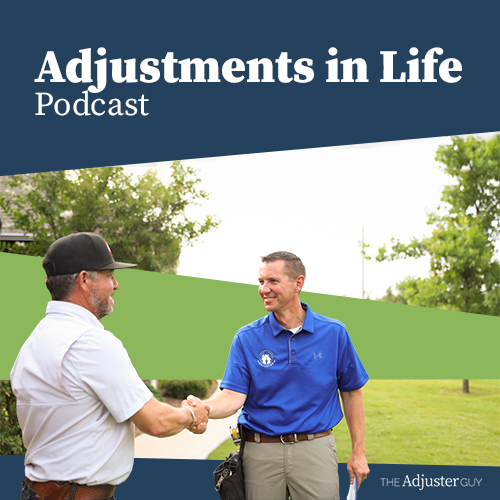Transcript
Alan: All right folks! Well, welcome back to another episode of Adjustments in Life.
You know there’s a difference in some of the things that we do as adjusters out there, and there’s a little bit different paths you can take. Some of the adjusters out there moved towards a more of a staff side—which would be working out directly as an employee of one of the major carriers.
And then of course the majority of us are zoned into IAs, we’re gonna follow that path you know.
But there’s a distinct difference in the two, and it’s important to know some of the perspectives either direction. And as a new adjuster or adjuster that’s been only in the field for a couple years, you might be intrigued by that—you might want to know more about the staff side and that might be something that you’re interested in doing.
So I have a guest come on the show today that actually has spent his career in the adjusting field working on the staff side for one of the nation’s biggest insurance carriers. I actually got acquainted with him while I was trying to find my way through the field of adjusting and trying out the different carriers in and seeing what they had to offer.
Him and I have had a really good relationship not just work-wise but we’ve become pretty good friends over the years. I felt by bringing him on the show he could bring us some good insight if anybody was on the fencing in a direction that they were wanting to go in this trade, he might be able to help them out with that.
I’m gonna introduce Mr. Jim Steele. Jim, thanks for joining the show today.
Jim: Thanks for having me on Alan. I’m really excited to be here.
Alan: Like I said, you and I have had a pretty good relationship over the years; I’m not even sure—gosh it’s probably been six or seven years we’ve known each other now. I just want to say before we get started that I’m really appreciative of our work relationship and our friendship and hope that we can carry that on in years to come and continue to work together.
Jim: Absolutely has been a great, great relationship that you and I have formed and everything. It’s been something that I cherish, and it’s always great to bounce ideas off of each other—get a different perspective, so I appreciate you having me on and it’s always good talking to you.
Alan: Yeah for sure.
Where do you come from man? What got you started in the claims industry from the beginning?
Jim: Before coming to the insurance industry, I was a officer in Arkansas, and I finish my criminology degree and was pursuing federal law-enforcement. I was married at the time—my wife wasn’t crazy about me staying in law-enforcement—so I was in talking to my insurance agent paying my monthly dues and talking to her about that.
She was telling me about haw the company has special investigation unit for investigating fraud. That really interested me, so I applied with the company and then getting the job and it was about 23 years ago, I guess, now.
I started in an in-office unit for a couple years and not really in-office kind of guy; so I quickly went over to the field field position as a claim specialist and then I learned about catastrophe. Instead of going into the special investigations route. I decided to try my hand at catastrophe claim handling and absolutely loved it.
I was able to work my way up into becoming a trainer and then eventually into the management program on the catastrophe team for about 15 years. And then took a management position in one of our big hub locations in Arizona.
Then I kinda just bounced around and currently managing a team in New Mexico. There’s been a lot of great I guess experience and a wide variety of experience 23 years with the company.
So its afforded me to work with the independence—actually quite often especially when I was on catastrophe and I recently was managing some wildfires out in California and then Colorado where I had a large percentage of independent adjusters to York with.
Alan: That’s awesome! I really liked I like the fact that you pursued a career more on that staff-side—or primarily stayed with that company—but saw the perspective of working with IAs and understanding how the IA industry worked. Considering the time that you spent as working a staff as a carrier, but being involved with the IAs, what are some of the key things that you see are different looking at it from staff looking at IA and what would some of the positive or negative things that you see would be different between the two?
Jim: You know, the big thing for me and I don’t actually kicked around the idea of becoming an independent several times; it was always very appealing to me and what really appealed to me was just the freedom and flexibility of being able to work when you want to work and have the opportunity at least to turn down some work if you weren’t in a place where you could take it at that moment.
I think the thing that kept me from going over was having a family and being from the catastrophe side of things. Weather is an unpredictable thing, so you know to me it was always feast or famine; you can make a tremendous amount of money when the storms rolling in, but if he had a off-season there’s was always a potential that there might not be any work.
So I kind of always tended towards the security side of it, maybe not always having as much money in the long run on right now coming in; but knowing every two weeks I was getting a steady paycheck.
Alan: That’s right. Yeah, that is that is some thing that is drastically different. You were able to and still are able to say you know “I have a guaranteed paycheck whether they tell me to go sit at home or they put me on site somewhere.”
And you’re right, as an IA, we only have the opportunity to make money when there’s claims; so there has to be an event take place for us to you know get that income that we’re wanting. And that’s an unpredictable thing from year to year to year.
Jim: I think change and also I think if you set yourself up as an independent to be flexible, I think you’ll have opportunities even in the slow times. I know a lot of the big carriers are trying to do more with less and a lot more virtual assignments; so I think if you set yourself up and you’re adaptable and have an open mind about things, I think there is and will be a lot more opportunities.
And it may not always be catastrophe type work—it may be an office work, you helping out with different states and everything—but I think times are changing; and I think it’ll be a lot be able to bring a lot more steady work to the independent side.
Alan: Do you guys see—and that’s something that we don’t always see first—but on the staff side, do you see a large amount increasing of the virtual style type claims more so or can we expect to see that more growth on that end in the coming future?
Jim: I believe so. I think, especially with Covid happening, I think we were already kind of going in that direction in the industry. And I think with Covid happening back a little over a year ago, I think that accelerated it for a lot of companies and kind of forced us to jump in headfirst in a lot of the new technology and learn new ways of doing business.
I see now whether it’s staff—or even on the independent side—I see us hiring people that may be working in California, but they’re living in working out of their home in Texas or Arkansas. I think we’re going to see more of that to where we’re actually going to be able to work virtually and even with the technology now we know perfecting technology to where now we can do inspections without actually having to be there or even in the same state.
So I think we’re going to continue see more. And i think as technology gets better, it’ll just continue to become more efficient. From a business perspective from a company I think it’s brilliant and advantageous for a company to not be be paying for travel and lodging and even office space where people can work out of their homes.
Alan: Yeah, for sure! Bouncing back with that IA versus the staff, if you were speaking to a new adjuster or if you knew there was a brand new adjuster sitting here listening to this podcast and they were trying to figure out which direction—they hadn’t been deployed yet and they’re trying to figure out if staff is a direction that they want to go—what would you tell them? What would you say would be the most positive factors that you could give them to choose that path or that direction in the field?
Jim: I think for a new adjuster trying to determine which way he wants to go he or she needs to look at where they are in their life: if they have a family, if they are able and willing to travel around the country and be away from their families for extended periods of times.
And I think the technology piece of it—I think it’s gonna be less important as we move forward as far as being away as often for long periods of times.
But, yeah, one of the things I see about the staff is I think starting off being able to get that training and maybe not be as stressful because you’re not depending on jumping into something brand new and be super efficient at it to make money.
Because as an independent, I think one of your first few assignments you’re gonna have to probably sign off that this is my schooling, this is how I’m gonna learn, it’s an investment into my future; and you may not make as much money on the first couple of storms, but you have to go into with it that that’s your college—that’s your trade school in order to become better.
I think it’s important to have an open mind where on the staff side, you can be a little less stressed about having that money coming in and be a little bit more relaxed about learning as quickly as what you may have to on the independent side.
Alan: So as a new adjuster coming into the staff side, the what’s the standard routine, what’s the training process? I know every big carrier is going to have a little bit different program, but from what you’ve seen in your years of working the staff side, what would a picture of “I’m coming in as a new adjuster until the day you were going to go out and deploy.” What’s a picture of that process?
Jim: Things have changed a lot in the last several years. Use to we were way more focused on like training schools or training classes and everything that we would send people to and it was a lot more hands-on with it—with an actual trainer.
Nowadays, you still have that to a certain extent and then you come in and then it’s becoming more on the job training then then I think it used to be especially the initial status of it. Used to we would rely heavily on our training division for a longer period of time than what we do now.
And now it falls on the training and direction falls more on the managers and even their peers. I’ve been lucky with the teams that I’ve had where peers have direct involvement and are very engaged with training through new folks.
I don’t think that is always the case. I would like to think that it is because it benefits them as well when they come in to help their peers get off to a good start. It takes a load off of them when they are working together.
But I think with the technology and everything, I’m kind of curious to see how that’s going to go forward in the future because I think we’re going to see a lot more of the virtual and where maybe the teams are not all one area together and everything.
I think it’s going to be more of virtual learning than it necessarily is now.
Alan: Sure, I know I can tell you from the IA side, you can get some in the field training prior to a deployment or prior to actually handling your first claim if you can find another adjuster that’s going to let you shadow with them or you can go work or you know a lot of guys are charging now but you can get an opportunity to go do some ride along‘s.
But there, and you tell me if I’m wrong, but there is more of a protocol of training that’s going to be involved on the staff side where you’re going to actually go learn the job more so on the staff side before you start handling claims on your own then the typical IA side of “well, you showed up, here’s your first batch of claims, go get them.”
Jim: Yeah no I agree. I think you said something about the shadowing on the independence side. I think that’s a great tool for a new independent adjuster to get some training and not necessarily have all the expenses upfront at one time of having to buy all the equipment —kinda dip their toes in to see if that’s really what they want and can I how the process works.
On the staff side, it’s kinda—yeah I think just having the opportunity to you need to be a little bit more relaxed as business gets more and more competitive. Expectations are that they’re able to be productive faster and faster, and I see it becoming a lot more like the independent side to kinda be out there and start producing a lot quicker than maybe we have in the past.
Alan: Yeah well training programs definitely do change over time and the pace that’s in the world in right now, I can see that coming or there’s a little bit more expected sooner than maybe there used to be. I’ve heard rumors of you know 10 years ago, 15 years ago there was a six month seven months training process that every staff adjuster went through before they handled their first claim.
And coming from the IA side, it was that was kind of amazing to hear that because you know we didn’t ever do that kind of train. We were expected to know and be able to handle the claims properly, but the training programs were never to that extent—the IA side and I don’t expect ever will be.
We’re expected to know a lot of that coming in.
So regarding advice, when I first started there was a guy that helped train me that you know he gave me some valuable advice I still remember to this day; and I apply that and everything that I do because it was such a good solid advice that I can still apply it to everything that I do and it works well.
What was that advice for you? Along through your journey of becoming who you are in the claims industry, was there ever that one piece of advice somebody gave you that—and it didn’t really have to be somebody at some of that gave you a piece of advice along the way that you used to in your every day application of life it says this is what helped make me be successful?
Jim: Yeah, I did receive some advice when I first started working in the insurance industry and it’s not the ra-ra, go-get-them advice that would pump somebody up; but it was probably some the best advice I ever had just as I approach my job in general, my day-to-day operations of how I communicate with people whether customers are internal or external vendors.
And that advice was: you’re going to make a lot of money doing or we have the potential to make a lot of money and as an independent you have the potential to make a lot more money. But the advice was: no matter how much money you start making or how good you get at it, always remember that the perception of the insurance adjuster with a right or wrong but most people‘s perception of an insurance adjuster is we’re one step above a used car salesman—not that there’s anything wrong with a used cars salesman.
As you go out and talk to customers, keep that in the back of your mind and when your communicating with them and make sure that you’re empathetic with them that you keep in mind and they just lost something very valuable—otherwise they wouldn’t be having a claim. And even more important, when your talking to them and you tell them something is not covered make sure that you’re empathetic and that you’re at least come across as caring.
Take the extra time to actually explain to them. Sometimes we get so busy with our lies with our jobs that we just run from claim to claim to claim as quick as we can trying to get as much done and we forget to actually slow down and actually talk to them and make sure they understand kind of the process—what’s covered, why it’s not covered, the reason behind it and taking that extra time out.
It may take a little bit more time upfront, but it saves you a tremendous amount of time on the backend. And I know from a manager perspective, I would say that probably 90% or more of the of the complaint calls that I get—they’re not from time delays or not getting enough money or even being denied.
Ninety percent of the complaints that I get are because the adjuster was rude or didn’t take time to communicate with them; and I think that that’s huge. Just gotta remember where you are and what’s going on around you and not getting so caught up in getting to that next claim that you don’t do what’s right for that customer—treat every customer like it could be your parents or your grandparents and kinda help them through that the process.
Like I said they just suffered a pretty traumatic loss in most cases.
Alan: That’s right. I know I have this drilled in to me—it was one of the things that I was given early on—and I share this a lot with folks. With the technology today, being able to purchase your policy online versus always going to an agent—and I know some of the bigger carriers have a plethora of agents that still communicate regularly or that they would communicate regularly with.
It’s so easy to buy your policy online now that when you go out there as the adjuster you may be do you the first face they ever put a connection with from that company. You may be the first person they ever meet that has anything to do with that company.
So you are basically representing—your the face of the company to that person at that point. So how your communication process works with them and how well that visit goes can either make or break that business relationship from that point forward. So that’s huge—that interaction and communication means a lot.
Jim: You’re absolutely right. And whether you working for my company or a competitor they’ve hired you to do a job and there’s more to that job then just numbers and the big piece of that is that customer and making sure that your building those good relations for the company that you’re having to be hired by.
Alan: So kinda along those same lines that kind of leaning back towards the IA side—with you as a manager, some of the things that you spoke about with with your adjusters working under you when it came to that type of communication. It made me think about as a manager working for the carrier, when you’re working with the IAs and you start watching them handle their claims and take care of their duties as an adjuster, what are the key things that you can pinpoint and say that in the eyes of the carrier, you make a great adjuster?
Jim: I think the number one thing that stands out you know for most is communication. And that can be both with the customer—making sure that you’re giving them regular updates and if they’re not getting updates they’re going to be calling the manager and you know we shouldn’t be filling out complaints because you’re not hearing from their adjuster or they don’t know what’s going on, they should be aware of the process—and also whether it be a staff adjuster or independent adjuster just communication with your leadership.
I have worked a lot of storms where people are maybe afraid to ask questions or tell somebody what they don’t know, but I think it’s important as me being a leader, I wanna know if you’re new to either claims or maybe you’re just new to a certain type of claim—such as the fire losses i was working out in California—you may be really good at wind and hail claims, but if you’ve never handled those total loss fire claims—it’s a different thing going on.
And just coming to your leadership saying “I don’t have a lot of experience in this.” That’s going to take you a long way because it helps me when I am sending claims to you or you know I hope that I can at least point you towards the help you need and get you set up for success.
Because ultimately it’s in our interest for everyone to be successful. If I know you’re not experienced in something, I’m going to try to limit the severity of those claims that I get to you and things that you could learn from it, but not drown in it at the same time.
So if you’re successful, I’m successful, the organization is successful; and I don’t know if people aren’t communicating with me and people are afraid to tell me “hey, I don’t know this. I don’t have experience in this.”
I think that’s incredibly important on both sides—communication is the big thing.
Alan: Yeah I can agree with that. Because of the time I spent in the management on the IA side you know there was a day when you came into this trade and maybe not so much on the staff side but on the IA side that you you just kinda—you didn’t raise your hand, you found your way through; and, for better lack of words, faked it if you needed to. Faked it until you made it.
That’s how the industry was, but not today. In today’s industry, it’s OK to raise your hand. The days in my management, I wanted to know. I could help you get further and help everybody get along better if I knew who needed help and who didn’t.
I didn’t want you keeping your mouth quiet not saying anything because that didn’t get us anywhere but into a mess later on when I handed you something that you weren’t capable of handling. So that’s huge advice right there.
We’re gonna have to wrap it up here I’m about out of time, but is there anything again primarily the listeners of this program or are either brand new or relatively new and they’re just in their first year or two of getting started and they’re still trying to find their way.
Of course there’s a lot of avenues in this that they can go down and observe and try to figure out which best fits them.
Is there anything else that you just feel passionate that you would like to reach out and share with all those folks that are trying to find their way in that you think would be beneficial to them?
Jim: I think the best thing to have is a good attitude and be adaptable, be flexible. I’ve heard a lot of adjusters on the Independent side say “I don’t wanna work there cause they didn’t pay enough” and that’s fine if you’re highly experienced and at the top of the list of everything.
But if you’re a new adjuster coming in, kinda going back to an earlier statement is you have to look at it as a learning experience. and I think it’s important to get all the experiences early on as you can possibly get—even though some of those jobs may not be the highest paying or glamorous jobs out there and be flexible.
And I know I’m an old-school field guy—that’s what I like that’s what I love. I’m absolutely miserable if I have to do in office stuff and a lot of people that are opposite of that. But I think being flexible, being open minded to take those jobs that maybe you don’t like or maybe you think you don’t like but getting that experience, it’ll make you a better adjuster in the long run.
You’ll get a different side of it, a different perspective. You never know if you don’t try it, you might actually like it if you get in. Theres a lot of benefits to everything out there, so get out there and try as many different aspect of it that you can. Get all the experience as you can and look at it as: you may not make a lot of money on it, you may not even break even on some of it, but you’re gaining a lot of experience and that is invaluable.
Alan: Absolutely, absolutely. You have to approach this as in experience and education really more so than the income. The income will come. It’s going to be there, especially once you’ve established the knowledge and the experience. The income will come quickly. It doesn’t take long at all.
Yeah, I agree 100%. Thank you so much for joining! This was a great conversation. I think you did bring a lot of insight and can help a lot of folks; and I know I valued your information.
Our relationship started at a learning experience for me, and you were able to help me walk through that and grow where I was in my career at that time too. Again man, thank you so much for coming on.
Jim: Thanks for having me again Alan. It’s always a pleasure to visit with you and look forward to hopefully hanging out with you again soon.
Alan: Absolutely, absolutely. If anything we may—you never know—sometimes we end up right close to each other or on the same site and can catch up then too.
Alright folks we’re going to close out now, and I will see you again right here in two weeks.





